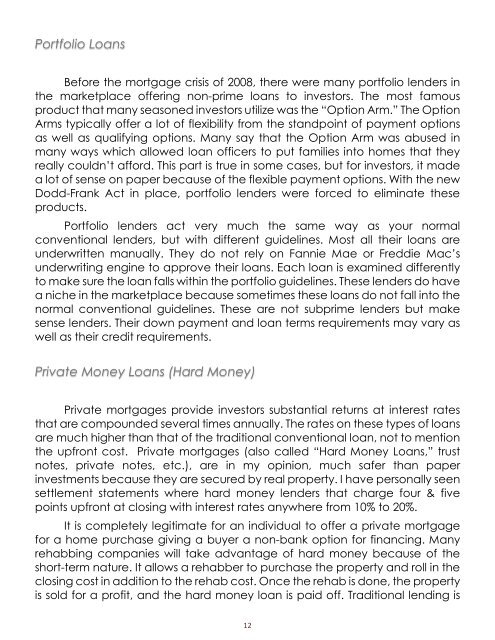You also want an ePaper? Increase the reach of your titles
YUMPU automatically turns print PDFs into web optimized ePapers that Google loves.
Portfolio <strong>Loan</strong>s<br />
Before the mortgage crisis of 2008, there were many portfolio lenders in<br />
the marketplace offering non-prime loans to investors. The most famous<br />
product that many seasoned investors utilize was the “Option Arm.” The Option<br />
Arms typically offer a lot of flexibility from the standpoint of payment options<br />
as well as qualifying options. Many say that the Option Arm was abused in<br />
many ways which allowed loan officers to put families into homes that they<br />
really couldn’t afford. This part is true in some cases, but for investors, it made<br />
a lot of sense on paper because of the flexible payment options. With the new<br />
Dodd-Frank Act in place, portfolio lenders were forced to eliminate these<br />
products.<br />
Portfolio lenders act very much the same way as your normal<br />
conventional lenders, but with different guidelines. Most all their loans are<br />
underwritten manually. They do not rely on Fannie Mae or Freddie Mac’s<br />
underwriting engine to approve their loans. Each loan is examined differently<br />
to make sure the loan falls within the portfolio guidelines. These lenders do have<br />
a niche in the marketplace because sometimes these loans do not fall into the<br />
normal conventional guidelines. These are not subprime lenders but make<br />
sense lenders. Their down payment and loan terms requirements may vary as<br />
well as their credit requirements.<br />
Private Money <strong>Loan</strong>s (Hard Money)<br />
Private mortgages provide investors substantial returns at interest rates<br />
that are compounded several times annually. The rates on these types of loans<br />
are much higher than that of the traditional conventional loan, not to mention<br />
the upfront cost. Private mortgages (also called “Hard Money <strong>Loan</strong>s,” trust<br />
notes, private notes, etc.), are in my opinion, much safer than paper<br />
investments because they are secured <strong>by</strong> real property. I have personally seen<br />
settlement statements where hard money lenders that charge four & five<br />
points upfront at closing with interest rates anywhere from 10% to 20%.<br />
It is completely legitimate for an individual to offer a private mortgage<br />
for a home purchase giving a buyer a non-bank option for financing. Many<br />
rehabbing companies will take advantage of hard money because of the<br />
short-term nature. It allows a rehabber to purchase the property and roll in the<br />
closing cost in addition to the rehab cost. Once the rehab is done, the property<br />
is sold for a profit, and the hard money loan is paid off. Traditional lending is<br />
12


